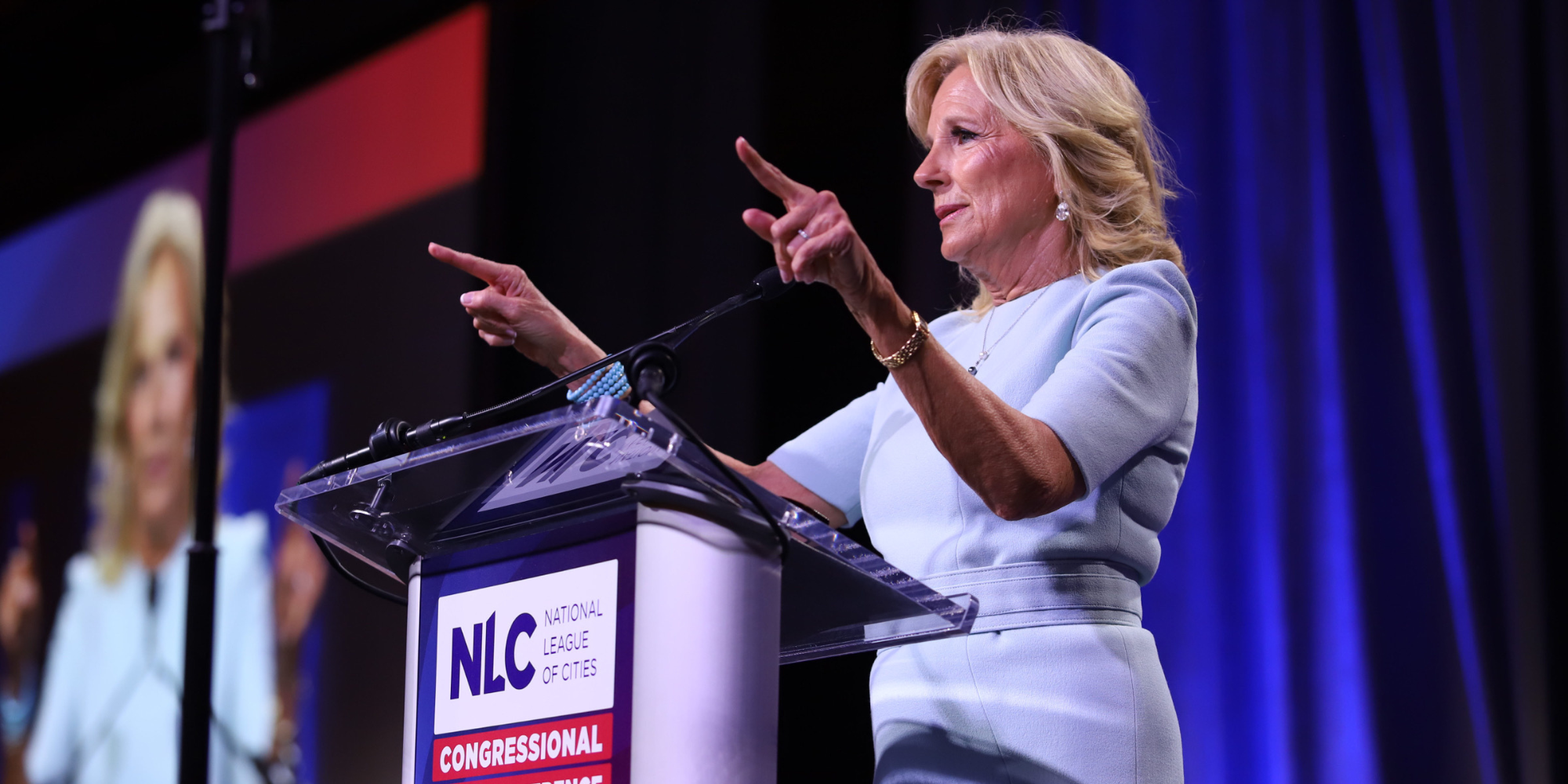More than 3,000 local leaders from across the nation gathered in Washington, DC for the 58th annual Congressional City Conference (CCC). The ongoing theme of this year’s CCC was the importance of education, partnerships, and job creation to build better cities, towns, and villages. Attendees heard from distinguished speakers, attended and engaged in workshops, networked with federal agency officials and discussed federal priorities that come to the aid of cities, towns and villages before heading to Capitol Hill where they took their message to members of Congress.
Below are the highlights:
Dr. Jill Biden, First Lady of the United States, Discussed the Importance of Bipartisanship, Education, and Jobs
The First Lady, in a speech to an audience of more than 3,200 local elected officials and youth council members highlighted the importance of local leaders working with the federal government to help students get the education and training they need for the careers that they want. Among the programs Dr. Biden mentioned was the Biden Administration’s Education Pathway, which starts with free universal preschool and goes through to high school. The program provides access to two years of affordable community colleges and connects students to great jobs. “In a time when we sometimes struggle to find common ground, these learning pathways bring us together. President Biden understands that. It’s why he’s making community college — colleges and career-connected learning top priorities in his 2024 budget,” said Dr. Biden.
National League of Cities President and Mayor Victoria Woodards Speech Stressed the Importance of Partnerships in Creating Possibilities for Communities to Thrive
Central to her presidential year, Mayor Woodards stressed the importance of partnerships to help expand inclusive housing and workforce policies that can create abundant opportunities. She emphasized that these partnerships, from the private sector and the government aid in creating good jobs and building great cities.
“We want to expand on these opportunities and build America’s next-generation workforce. Join us in working together to build thriving neighborhoods for your residents and build stable housing for our neighbors. We want to build cities, towns and villages where everyone feels safe.”
New Partnership Between NLC and the U.S. Department of Labor to Support Cities Workforce Investments in Infrastructure, Clean Energy & Advanced Manufacturing
In a panel discussion moderated by Barbara Humpton, CEO and president of Siemens Corporation with panelists Brent Parton, Acting Assistant Secretary, Employment and Training Administration, U.S. Department of Labor and Mayor Woodards, the three explained the need for opportunities for workforce development for residents at all levels of education and training programs to enhance their skills. to support cities, NLC and DOL announced the launch of Good Jobs, Great Cities Academy which will work with municipalities to accelerate their efforts to design, develop, and launch a workforce initiative over the course of the Academy. The initiative is now open for cities to apply. Up to 12 cities will be selected for the Good Jobs, Great Cities Academy. Learn more.
Mayoral Panel Discusses Homelessness, Safety, Violence Intervention and Mental Health in US Cities, Towns, and Villages
Politico reporter Juan Perez led a timely and insightful conversation with four mayors who are each taking action in their cities to address violence, homelessness, substance abuse and mental health. A central agreement among the mayors: results take time. The panelists were Brandon Scott, Mayor, Baltimore, Maryland; Chokwe Lumumba, Mayor, Jackson, Mississippi; Amy Shuler Goodwin, Mayor, Charleston, West Virginia and John Giles, Mayor, Mesa, Arizona.
The discussion centered on safety, policing, and mental health issues and how each of the mayors was tackling these issues in their cities. Mayor Goodwin spoke about the Charleston WV CARE Team and their work in addressing substance use disorder, mental health, and homelessness. She highlighted the importance of partnerships with federal agencies in investigating and solving crimes – specifically noting the recent methamphetamine seizure, the largest in West Virginia’s history.
Mayor Lumumba touched on trust within the community to help reduce violence. “There has to be a more comprehensive approach at violence reduction. Elected officials understand that a budget is a moral document that reflects the values of our community,” he said.
While Mayor Scott spoke about how his city has used ARPA funds in growing the program to expand the city’s violence intervention program. “We’ve had safe streets and violence intervention workers since 2008, now we look at how to grow that program and take it to the next level,” said Mayor Scott.
“We are in the compassion business. Public safety has to be synonymous with compassion, “ said Mayor Giles.
Administration Officials Emphasized the Need for Continued Partnership & Support with Local Leaders
From Housing & Urban Development Secretary Marcia Fudge to Department of Agriculture Secretary Tim Vilsack to Shalanda Young, Director of the White House Office of Management and Budget and Hugh T. Clements, director of the Department of Justice Office of Community Oriented Policing Services (COPS) attendees heard from high-level speakers from the White House and Biden Administration on President Biden’s appreciation for the hard work of local government, the importance of partnership with local leaders and his commitment to investing in cities, towns and villages.
“People know the work we do because we are the people closest to the people, said Secretary Fudge, a former mayor of Warrensville, OH. “Just as you work for me, I work for you. I am the voice of America cities, that’s what we do.”
Young emphasized that the values outlined in President Biden’s budget include lowering medicine and food prices for American families, ongoing federal investments in communities while being fiscally responsible and the fight to protect and strengthen Social Security and Medicare. Clements also made a call for increased collaboration and outreach with local leaders on public safety while senior advisors to the president John Podesta and Mitch Landrieu both expressed the need for continued partnership between the federal government and local leaders.
More than 600 Local Advocates Descended on Capitol Hill
To close off the conference, more than 600 individuals traveled to Capitol Hill where they met with members of Congress and shared the priorities for their cities, towns and villages. From the impact of critical funding that came through the American Rescue Plan Act to the funding that is coming through the Bipartisan Infrastructure Law and Inflation Reduction Act, local leaders were ready to share their story with their Congressional delegates.
Thank you to everyone who joined us, we can’t wait to see you next year!








